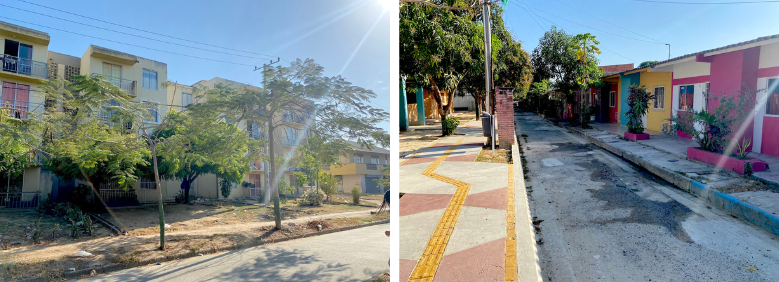 Medellin 2023
Medellin 2023
Having access to a home is one of the major challenges to reduce poverty and protect people’s safety and quality of life. In Colombia, around 3.7 million households (more than a quarter of the country's total) face a housing deficit . Moreover, 2 out of every 3 of these families need to carry out structural improvements to their homes. The lack of decent housing with proper plumbing and water supply is more widespread in rural areas, where more than 2 million families need to find an urgent solution to their housing problems.
The government of Colombia has acknowledged the importance of closing this gap and is now redirecting the focus of its housing programs away from catering for new housing and rent-to-buy schemes towards different initiatives to help improve the structural quality of housing and whole neighborhoods . The current challenge, enshrined in the National Development Plan 2023-2026, focuses on increasing access to housing by awarding priority to lower-income households and those living in vulnerable socio-economic conditions, by carrying out works in smaller cities and rural areas, and by fostering participation by communities themselves in the execution and planning of housing projects.

Some of the tasks facing the government include scaling up the scope of home improvement programs to structural improvement in urban and rural areas, developing lines of credit for the acquisition and restoration of housing for the vulnerable population, promoting community participation in housing construction, and guaranteeing the improvement of neighborhoods and informal areas in the cities. To achieve this, the Colombian authorities propose to carry out several actions that include:
(i) Accelerate the use of sustainable alternatives for constructing and improving housing in urban and rural areas
(ii) Combine housing improvement subsidies with loans using efficient processing schemes
(iii) Boost self-construction and the participation of existing social organizations in housing production and/or construction
(iv) Scale up the rural housing programs through the use of alternative systems of sustainable construction
(v) Combine the social cohesiveness component into the neighborhood improvement program to promote better relations between communities and migrants
The World Bank, through the Colombia: Resilient and Inclusive Housing Project, supports these actions. At present progress is being made to improve around 6000 urban and rural dwellings, including municipalities with large vulnerable populations such as Quibdó, Maicao and Villa del Rosario.

Plans have been drawn up for implementing 4 Comprehensive Neighborhood Improvement projects and 10 public space projects in municipalities with a high number of vulnerable families, including migrant families that have arrived in the areas over the last few years. The Project also includes a first pilot program to be carried out in Bogotá aimed at providing renting solutions for migrant families, and technical assistance related to alternative construction methods for more distinctive and cultural-interest housing.
In the medium term, it is vital to ensure continued collaboration between the national and subnational authorities in future mandates in order to continue to scale up the programs in urban and rural areas. At the same time, this agenda must include the strengthening of habitat and housing information systems and improve the technical capacities of municipalities to manage projects with legal tenure and public services. It is also important to prioritize resilient infrastructure works and neighborhood improvements to enable them to adapt to climate change, as well as engage communities in implementing habitat and housing projects.
Finally, it is necessary to include elements of urban regeneration, adaptation, resilience and climate change mitigation to achieve a real impact in the medium and long term.




Join the Conversation